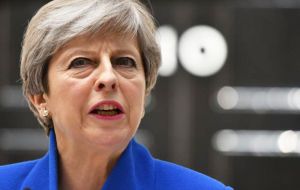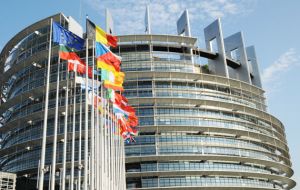MercoPress. South Atlantic News Agency
Theresa May says UK would take back control of its laws, with the end of Brexit
 Promises to end “direct jurisdiction” in policy papers, a phrase not used by Mrs. May, has raised questions about what “indirect” jurisdiction could be left for ECJ
Promises to end “direct jurisdiction” in policy papers, a phrase not used by Mrs. May, has raised questions about what “indirect” jurisdiction could be left for ECJ  ECJ ensures member states abide by EU law. Its rulings are binding on all member states; it also settles disputes of member countries with EU institutions.
ECJ ensures member states abide by EU law. Its rulings are binding on all member states; it also settles disputes of member countries with EU institutions.  Earlier Justice Minister Dominic Raab said there would be “divergence” between UK and EU case law after Brexit
Earlier Justice Minister Dominic Raab said there would be “divergence” between UK and EU case law after Brexit Prime Minister Theresa May has insisted the jurisdiction of the European Court of Justice in the UK will come to an end with Brexit. As the government published new details of its position, the PM said the UK would “take back control of our laws”.
But critics say it will be impossible to avoid European judges having a role in enforcing new agreements drawn up with the EU. Ministers say the two sides will keep “half an eye” on each other's rulings.
The ECJ is in charge of ensuring member states abide by EU law. Its rulings are binding on all member states, and it also settles disputes between countries and EU institutions.
In its new policy paper, the government:
• Does not rule out ECJ keeping its jurisdiction during the Brexit transition period that is planned after March 2019
• Promises to work with the EU on the “arrangements for judicial supervision” during this period
• Makes clear that the rights of EU citizens living in the UK after Brexit will only be subject to British law - a sticking point in the negotiations with the EU
• Says giving the ECJ authority over UK-EU disputes would be unprecedented and not “fair and neutral”
The promise to end “direct jurisdiction” in recent policy papers - a phrase not used by Mrs. May - has raised questions about what “indirect” jurisdiction the EU court could be left with.
In the latest publication, about how to enforce disputes after Brexit, the government has outlined several models used by other countries that it says show there is no need for the ECJ to be the final arbiter.
But some of these involve the ECJ having an influence on the outcome of disputes, for example by interpreting EU law in a way that binds a disputes panel, or for its past rulings to be taken into account.
Labour leader Jeremy Corbyn said the government was “clearly backtracking on its earlier red lines and saying there has to be some form of dispute resolution through some form of judicial process”. He added: “We have said that all along.”
Asked if Labour would vote against the government's key piece of Brexit legislation, the repeal bill, when MPs returned from their summer break, Mr Corbyn said: “We will make that decision just before the vote.”
The pro-EU Open Britain campaign group said the government's policy paper was a “climbdown camouflaged in jingoistic rhetoric”.
The group called it “frustratingly vague”, adding that in almost every example it provides, the ECJ would have “substantial direct or indirect power over the proposed new relationship between Britain and the EU”.
The government said it was not committing to following any of the arrangements set out, ruling out an “off the shelf” model.
And sources played down the significance of the word “direct”, saying it meant ECJ rulings would no longer automatically apply to the UK and that the court would no longer be able to strike down domestic UK laws.
Asked about her government's position, Mrs May said: “What we will be able to do is to make our own laws - Parliament will make our laws - it is British judges that will interpret those laws, and it will be the British Supreme Court that will be the ultimate arbiter of those laws.”
Earlier Justice Minister Dominic Raab said there would be “divergence” between UK and EU case law after Brexit, adding: “It is precisely because there will be that divergence as we take back control that it makes sense for the UK to keep half an eye on the case law of the EU, and for the EU to keep half an eye on the case law of the UK.”
In response, Guy Verhofstadt, the European Parliament's lead negotiator, tweeted that the ECJ had to “keep both eyes open” to protect citizens' rights.
The ECJ's remit extends into many of the areas where the UK is hoping to draw up new arrangements with the EU, including trade and citizens' rights.
Mr Raab said “some form of arbitration” would be needed, but that this would not be akin to a European court. Arbitration is where disputes are settled by a neutral third party. The UK and the EU could each appoint arbitrators and agree on a third, Mr Raab suggested.




Top Comments
Disclaimer & comment rules-

-

-

Read all commentsThe better question is why do you subscribe to “a British government propaganda organ”...?
Aug 25th, 2017 - 10:23 am 0Voice
Aug 27th, 2017 - 09:31 am 0Agreed. I see we have 3 posting names now. I suppose that most forums have their quota of mindless Trolls.
The question is why is this piece appearing in Mercopenguin, a British government propaganda organ supposedly devoted to America, South America and the “South Atlantic”?
Sep 02nd, 2017 - 05:36 pm 0Commenting for this story is now closed.
If you have a Facebook account, become a fan and comment on our Facebook Page!